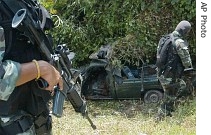2007年VOA标准英语-Thai Security Forces Accused of Abuse in Fighti(在线收听)
Bangkok
13 July 2007
Human Rights Watch says that despite government efforts at reconciliation, Thai security forces are still committing rights abuses in fighting an insurgency in southern Thailand. As Ron Corben reports from Bangkok, Human Rights Watch says such tactics are likely to strengthen the insurgents.
 |
| Thai soldiers examine the wreckage of a pickup truck that was hit by a bomb while carrying their colleagues during a patrol on a road in Pattani province, southern Thailand, 13 June 2007 |
"The army is still committing extra-judicial executions, lots of cases of torture, arbitrary arrests and disappearances and making the situation worse down there where the Thai government needs to win hearts and minds," he said. "We have done our own investigations, which show that disappearances are a widespread problem."
Adams was in Bangkok this week, meeting with diplomats and government officials to urge new efforts to end the three-year Islamic insurgency in the south.
Prime Minister Surayud Chulanont has tried to take a softer tone in the south since he came to power 10 months ago. But killings continue and there are concerns that the Islamic militants might try to move the battle elsewhere in the country.
Thailand's population is more than 90 percent Buddhist, but the southern border provinces are home to about 1.5 million Muslims.
"General Surayud has from the day he took office said the right things about the south," added Mr. Adams. "He said the main reason that the insurgency started was a lack of justice in the south. He has recognized poor socio-economic conditions in the south and he has continued to talk about respecting human rights and reconciliation."
Thailand's army chief, and the leader of the coup that put Mr. Surayud in office, General Sonthi Boonyaratglin, has also backed efforts for reconciliation.
But Adams says the security forces are divided. Some officers want to adopt a harder line toward the insurgents. But Adams says this is what the insurgents are seeking.
"What the militants want is an overreaction from the Thai government and the Thai military, because they want to demonstrate to the community in the south that they should not have any loyalty, allegiance or hope with the Thai state," he noted.
The insurgents themselves are shadowy and no group or leader has declared responsibility for the violence.
Over 2,400 people have died since the insurgency began in early 2004, in a long series of beheadings, bombings, and assassinations of civil servants and teachers.
Adams says that after a civilian government is elected later this year, it should adopt the recommendations of a National Reconciliation Commission. The commission calls for a greater civilian role in the administration of the provincial governments.
"The Thai government has to end extra-judicial killings, arbitrary arrests, torture and disappearances," he said. "It needs to fight a counter-insurgency within the law."
The southern region, which was a sultanate until coming under Thai control over 100 years ago, has faced sporadic violence over the past decades.
The region, one of the poorest in Thailand, has also long claimed of discrimination and government efforts to suppress the local Malay dialect.